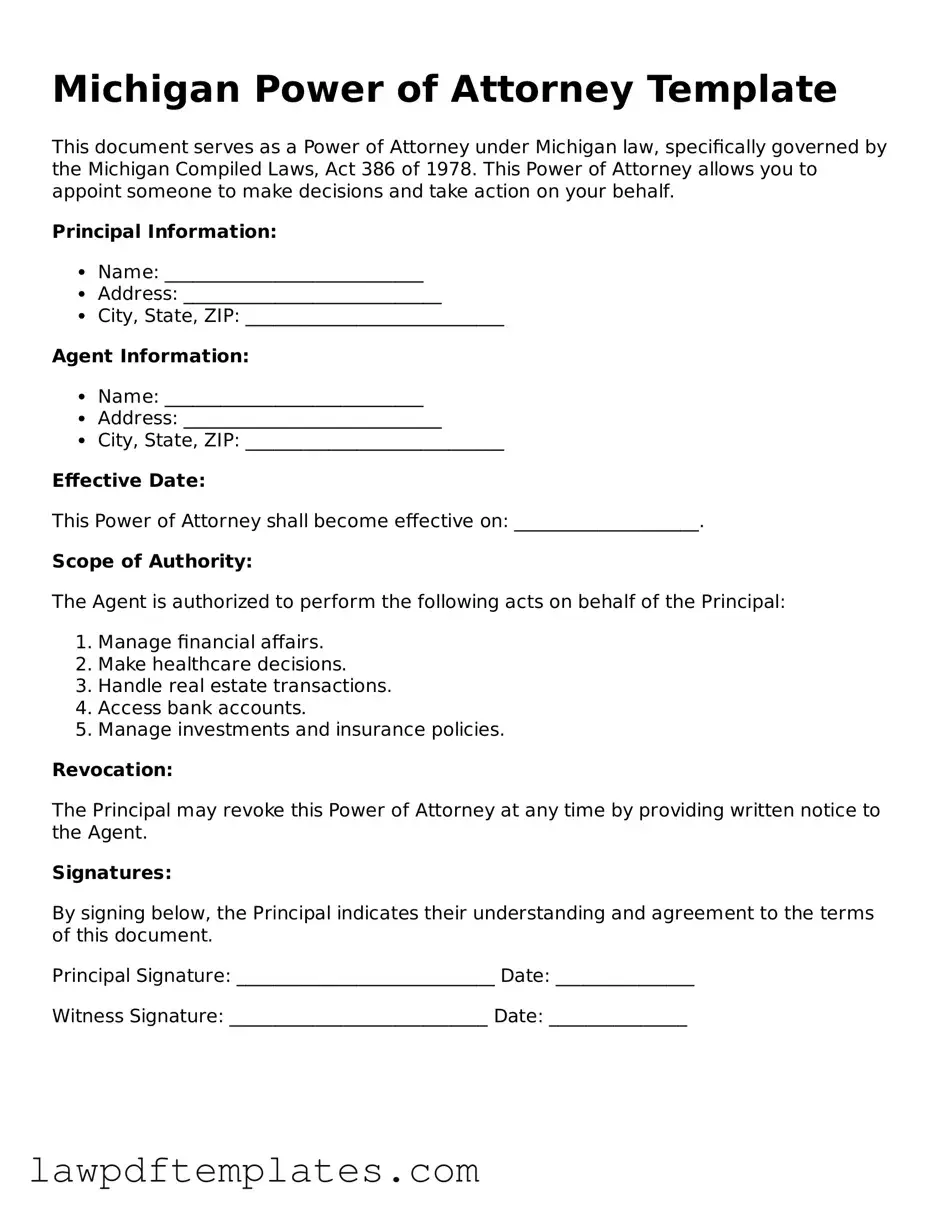Free Power of Attorney Template for the State of Michigan
Form Breakdown
| Fact Name | Description |
|---|---|
| Definition | A Power of Attorney (POA) in Michigan allows an individual (the principal) to designate another person (the agent) to make decisions on their behalf. |
| Governing Law | The Michigan Power of Attorney is governed by the Michigan Compiled Laws, specifically MCL 700.5501 to MCL 700.5523. |
| Types of POA | Michigan recognizes several types of POAs, including durable, springing, and medical powers of attorney. |
| Durable POA | A durable Power of Attorney remains effective even if the principal becomes incapacitated, ensuring continuous decision-making authority. |
| Springing POA | A springing Power of Attorney only takes effect upon the occurrence of a specified event, such as the principal’s incapacitation. |
| Medical POA | A medical Power of Attorney specifically allows the agent to make healthcare decisions on behalf of the principal when they are unable to do so. |
| Revocation | The principal can revoke a Power of Attorney at any time, as long as they are competent to do so. This must be done in writing. |
| Agent Responsibilities | The agent is required to act in the best interests of the principal and must follow any specific instructions outlined in the POA document. |
Sample - Michigan Power of Attorney Form
Michigan Power of Attorney Template
This document serves as a Power of Attorney under Michigan law, specifically governed by the Michigan Compiled Laws, Act 386 of 1978. This Power of Attorney allows you to appoint someone to make decisions and take action on your behalf.
Principal Information:
- Name: ____________________________
- Address: ____________________________
- City, State, ZIP: ____________________________
Agent Information:
- Name: ____________________________
- Address: ____________________________
- City, State, ZIP: ____________________________
Effective Date:
This Power of Attorney shall become effective on: ____________________.
Scope of Authority:
The Agent is authorized to perform the following acts on behalf of the Principal:
- Manage financial affairs.
- Make healthcare decisions.
- Handle real estate transactions.
- Access bank accounts.
- Manage investments and insurance policies.
Revocation:
The Principal may revoke this Power of Attorney at any time by providing written notice to the Agent.
Signatures:
By signing below, the Principal indicates their understanding and agreement to the terms of this document.
Principal Signature: ____________________________ Date: _______________
Witness Signature: ____________________________ Date: _______________
Common mistakes
Filling out a Power of Attorney (POA) form in Michigan can be a straightforward process, but several common mistakes can lead to complications. One of the most frequent errors is failing to specify the powers granted to the agent. It is essential to clearly outline what decisions the agent can make on behalf of the principal. Without this clarity, the agent may not have the authority needed to act in critical situations.
Another common mistake is not signing the document in front of a notary public. In Michigan, a Power of Attorney must be notarized to be valid. Neglecting this step can render the document ineffective, leaving the principal's wishes unfulfilled.
Some individuals overlook the importance of including alternate agents. If the primary agent is unavailable or unwilling to act, having a backup can prevent delays in decision-making. Failing to designate an alternate can lead to unnecessary complications and stress for the principal and their family.
People often forget to date the document. A missing date can create confusion about when the Power of Attorney becomes effective. This oversight can lead to disputes regarding the authority granted, especially if the principal's condition changes over time.
Another mistake involves not discussing the arrangement with the chosen agent beforehand. It is crucial for the principal to communicate their wishes and expectations. If the agent is unaware of the principal's preferences, they may inadvertently make decisions that do not align with the principal's intentions.
Some individuals fail to review and update their Power of Attorney as circumstances change. Life events, such as marriage, divorce, or the birth of a child, can impact the appropriateness of the designated agent or the powers granted. Regularly revisiting the document ensures that it remains relevant and effective.
Inaccurate personal information is another issue that can arise. Errors in names, addresses, or other identifying details can create confusion and complications. It is vital to double-check all information to ensure accuracy and clarity.
Individuals may also overlook the requirement for witnesses. While Michigan does not mandate witnesses for a Power of Attorney, having them can provide additional validation and support in case the document is challenged. It is advisable to consider this option for added security.
Some people mistakenly believe that a Power of Attorney automatically grants unlimited authority. This misconception can lead to misunderstandings about the scope of the agent's powers. Clearly defining the extent of authority is essential to avoid potential conflicts.
Lastly, not keeping copies of the signed document can create issues when the agent needs to act. It is important to provide copies to the agent, relevant family members, and any institutions that may require it. This ensures that the agent can fulfill their responsibilities without unnecessary delays.
Discover More Power of Attorney Templates for Specific States
California Durable Power of Attorney - Crucial document for individuals living alone or with chronic illnesses.
To facilitate the ownership transfer process, consider utilizing our informative guide on how to fill out the Illinois bill of sale form efficiently. You can access the form by visiting this link.
Illinois Power of Attorney for Property - This document facilitates a smoother transition of authority during health crises or unexpected events.
